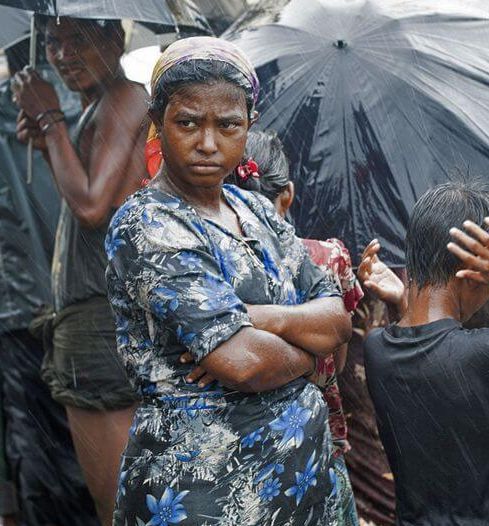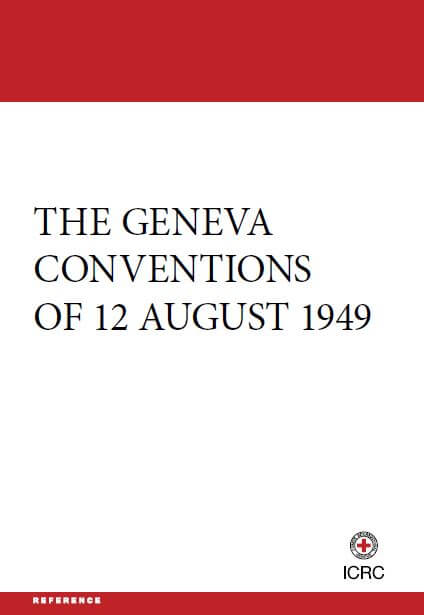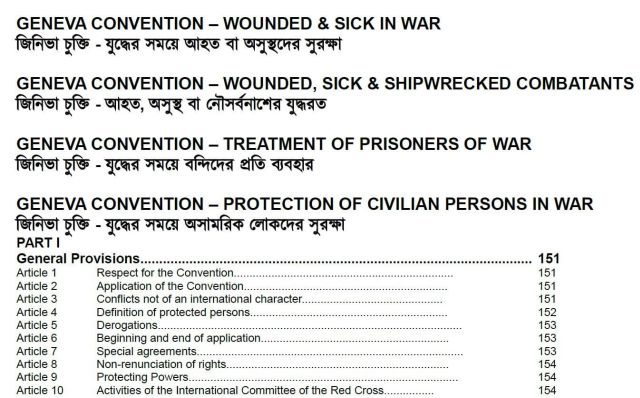GOVERNMENT 05 – MILITARY & WAR
Deuteronomy 5:17 - Murder versus war killing
What is murder?
- Intentional, planned, motivated killing
Are the following then murder?
- Killing of a convicted murderer by a lawful judgment … no.
- Killing of an enemy soldier in war … no.
Many Christians take this view:
- No killing whatsoever can be right
- one should not give death penalty
- one should not become a soldier “Pacifism”

No death penalty?
- any nation needs a capital punishment (death or lifelong imprisonment)
- if politically unstable, maybe judgments are continually overturned or kidnapping occurs
No army / war?
- You can choose to have no army (Example: Lebanon)
- You cannot choose to have no war.
- ‘no army’ tends to attract other armies
- a nation must guarantee its own survival, safety, borders
- option of nation covenants to prevent war
- option of defensive only army in case of war (Example: Switzerland)
Deuteronomy 20:1-2 - Victory & military strength
“When you go out to war against your enemies, and see horses and chariots, an army larger than your own, you shall not be afraid of them, for the LORD your God is with you, who brought you up from the land of Egypt.”
What can we learn from this?
- Victory in a war is not primarily dependent on equipment, size of army,
power, technology - Victory of a war is primarily dependent on God’s favor
But how can I know whether God wants a war or not? Who is right?
- Difficult! Ancient Israel was a special case, used by God as model for a time, directly instructed by God. But today?
Joshua 5:13-15 - God is for all
- This is the most clearly commanded war in all Scripture: Israel conquering the promised land under Joshua’s leadership
“Once when Joshua was by Jericho, he looked up and saw a man standing before him with a drawn sword in his hand. Joshua went to him and said to him, “Are you one of us, or one of our adversaries?” He replied, “Neither; but as commander of the army of the Lord I have now come.” And Joshua fell on his face to the earth and worshiped, and he said to him, “What do you command your servant, my lord?”
- God is not pro-Israel and contra-all others!
- God is always for people, for all people on both sides of a war
- God is always against injustice and evil and bondage, whoever commits it
- God is always for justice, righteousness & freedom, whichever side it is found on
The question then becomes one of how ‘right’ or ‘justified’ a war is
- Difficult again. But somewhat clearer.
What is a ‘wrong’ or ‘unjustified’ war?
- aggressive or offensive war
- unprovoked war with no prior injustices
- a war with no negotiations, an undeclared
- a war using unnecessary violence
Deuteronomy 20:3-8 - Free will in recruitment
“Do not loose heart … Has anyone built a new house? … planted a new vineyard? … become engaged to a woman? … he should go back. Is anyone afraid or disheartened? He should go back or he might cause the heart of his comrades to melt like his own.”
- Soldiers must understand their job, danger, risk
- Military service must be voluntary, no force in drafting
- Have lived a life to some degree (not teenagers, not children)
- Have a life to go back to (Example of World wars I & II)
Numbers 1:2-3 & 26:2 Age for military
“Take a census … from twenty years old upward, every-one in Israel able to go to war”
- Age for drafting was 20y in Israel. Usually men were considered legal adults by 12y, many married not much later than that. That means they were already established by the time they were of drafting age
- Age for drafting in Switzerland is 18y, in many countries it is even younger
- Typically the longer a war runs, the younger the generations that are grafted into war (18y > 16y > 14y)
- Older soldiers are more experienced, less easily manipulated, have better judgment, have more courage. They also have more of a life to return to after war > typically less long-term damage & trauma
- In WWI they found that soldiers who had had a ‘life prior’ (family, job, business, work experience) made the re-entry far better than teenagers who had been drafted.
- Child Soldiers: Young boys forced, drugged, traumatized, deceived into military

Deuteronomy 20:10 - Preceding negotiations
- war must be preceded by negotiations
- war is a last remedy if negotiations fail
- war must be declared. No surprise attack in peace times.
Deuteronomy 20:11 - Respect rights in surrender
If it accepts your terms of peace and surrenders to you, then all the people in it shall serve you at forced labor.
- no killing of people who surrendered
- if surrender, agreements must be kept, rights of conquered must be guarded
- prisoners of war can be put to forced labor, but no killing, raping, starving
Deuteronomy 20:12-15 - Combatants versus non-combatants
If it does not submit to you peacefully, but makes war against you, then you shall besiege it … you shall put all its males to the sword. You may, however, take as your booty the women, the children, livestock and everything else.
- In war one must discriminate between combatants (men) and non-combatants
(women, children, elderly, disabled, …) - only combatants may be killed in a war
- non-combatants must be left alive (their rights later)
- No violence to non-combatants (degrading, rape, mental torture, starving …)
- No non-discriminate weapons (ABC weapons: atomic, biological, chemical)
Deuteronomy 20:19-20 - Long-term damage prohibited
“If you besiege a town for a long time … you must not destroy its trees … although you may take food from them, you must not cut them down. You may only destroy the trees that you know do not produce food; may cut them down for use in building siege works against the town “
- During a siege:
- do not cut down fruit trees
- take wood for siege works (essential for war) only from non-food trees
- Why is God commanding this?
- cutting fruit trees
- less food production
- trees take time to grow
- no right to destroy in one moment investment of many years
- limits to damage in war, especially long-
term damage, irreversible damage


Summary: basic thinking of Deuteronomy 20
Are there rules to warfare? Isn’t war total destruction without rules nor mercy? … No!
- Before starting war solution by negotiations must be seriously attempted
- War must be declared
- War must discriminate between combatants and non-combatants
- War must limit damage inflicted, especially long-term or irreversible damage
Luke 14:31-32 - no hopeless-endless wars
- A parable, yet the principle stands: Declare war only if there is a chance to win it.
- No endless-hopeless wars, no destruction-derby, no revenge blood letting
Deuteronomy 21:10-14 - Treatment of female captives
Suppose you see among the captives a beautiful woman whom you desire and want to marry, 12 … bring her home to your house: she shall shave her head, pare her nails, 13 … and shall remain in your house a full month, mourning for her father and mother; after that you may go in to her and be her husband, and she shall be your wife. 14 But if you are not satisfied with her, you shall let her go tree and not sell her for money. You must not treat her as a slave, since you have dishonored her.

- female captive cannot be simply ‘taken’, ‘used’, raped > a procedure put in place
- this is rape prevention … it’s not a total prohibition, but nothing below a legal marriage gives a person ‘rights’ to the female captive > protection of captives’ rights
Why the one month procedure?
- giving time to mourn, to transition, to adjust to new situation > reduce trauma
- cut hair / nails is a hygiene issue (reducing chances of infection / infestation) … but
it is also a ‘cool your head’ thing: the attractiveness of the woman is reduced - time in the family would also give other family members a chance to evaluate & put
in a word of caution / reason / objection - the whole procedure is to slow down, to make think, a reality-check … do I really
want this? Is this really worth it?
If released, then as free person (not sold as slave) … why this addendum?
- there is an acknowledgment that a marriage like this has rather shaky foundations
- Since she is sent away and dishonored > not allowed to sell as slave anymore.
Modern Rules for warfare Geneva Convention
- War must be declared before started
- Must distinguish between combatants and non-combatants
- No use of rape, violence, killing of non-combatants as war strategy
- Only combatant-combatant war … even there no atrocities, dishonoring, degrading
- No terrorism … as this means targeting of civilian population
- No ABC weapons … as they can’t discriminate combatants and non-combatants
- No preventable or unnecessary damage (archaeological sites, historic buildings, dams, nuclear power plants, …)


- If no chance to win, don’t go to war
- Protection of injured and conquered combatants and non-combatants of both sides
Examples
- A woman in a war-zone may not be killed. If she takes arms, she can be killed as a
combatant, but she may not be raped. - To establish head quarters or weapon storage in a densely populated civilian area
is ‘playing dirty’. To use a burka to hide detonation materials is ‘playing dirty’. - Terrorism is precisely not keeping these rules: surprise attacks, civilians targeted, …